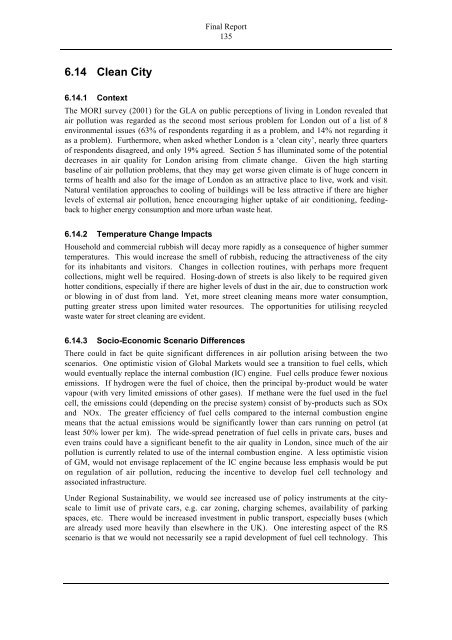London scoping - ukcip
London scoping - ukcip
London scoping - ukcip
Create successful ePaper yourself
Turn your PDF publications into a flip-book with our unique Google optimized e-Paper software.
6.14 Clean City<br />
Final Report<br />
135<br />
6.14.1 Context<br />
The MORI survey (2001) for the GLA on public perceptions of living in <strong>London</strong> revealed that<br />
air pollution was regarded as the second most serious problem for <strong>London</strong> out of a list of 8<br />
environmental issues (63% of respondents regarding it as a problem, and 14% not regarding it<br />
as a problem). Furthermore, when asked whether <strong>London</strong> is a ‘clean city’, nearly three quarters<br />
of respondents disagreed, and only 19% agreed. Section 5 has illuminated some of the potential<br />
decreases in air quality for <strong>London</strong> arising from climate change. Given the high starting<br />
baseline of air pollution problems, that they may get worse given climate is of huge concern in<br />
terms of health and also for the image of <strong>London</strong> as an attractive place to live, work and visit.<br />
Natural ventilation approaches to cooling of buildings will be less attractive if there are higher<br />
levels of external air pollution, hence encouraging higher uptake of air conditioning, feedingback<br />
to higher energy consumption and more urban waste heat.<br />
6.14.2 Temperature Change Impacts<br />
Household and commercial rubbish will decay more rapidly as a consequence of higher summer<br />
temperatures. This would increase the smell of rubbish, reducing the attractiveness of the city<br />
for its inhabitants and visitors. Changes in collection routines, with perhaps more frequent<br />
collections, might well be required. Hosing-down of streets is also likely to be required given<br />
hotter conditions, especially if there are higher levels of dust in the air, due to construction work<br />
or blowing in of dust from land. Yet, more street cleaning means more water consumption,<br />
putting greater stress upon limited water resources. The opportunities for utilising recycled<br />
waste water for street cleaning are evident.<br />
6.14.3 Socio-Economic Scenario Differences<br />
There could in fact be quite significant differences in air pollution arising between the two<br />
scenarios. One optimistic vision of Global Markets would see a transition to fuel cells, which<br />
would eventually replace the internal combustion (IC) engine. Fuel cells produce fewer noxious<br />
emissions. If hydrogen were the fuel of choice, then the principal by-product would be water<br />
vapour (with very limited emissions of other gases). If methane were the fuel used in the fuel<br />
cell, the emissions could (depending on the precise system) consist of by-products such as SOx<br />
and NOx. The greater efficiency of fuel cells compared to the internal combustion engine<br />
means that the actual emissions would be significantly lower than cars running on petrol (at<br />
least 50% lower per km). The wide-spread penetration of fuel cells in private cars, buses and<br />
even trains could have a significant benefit to the air quality in <strong>London</strong>, since much of the air<br />
pollution is currently related to use of the internal combustion engine. A less optimistic vision<br />
of GM, would not envisage replacement of the IC engine because less emphasis would be put<br />
on regulation of air pollution, reducing the incentive to develop fuel cell technology and<br />
associated infrastructure.<br />
Under Regional Sustainability, we would see increased use of policy instruments at the cityscale<br />
to limit use of private cars, e.g. car zoning, charging schemes, availability of parking<br />
spaces, etc. There would be increased investment in public transport, especially buses (which<br />
are already used more heavily than elsewhere in the UK). One interesting aspect of the RS<br />
scenario is that we would not necessarily see a rapid development of fuel cell technology. This

















